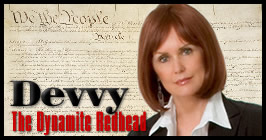By: Devvy
December 1, 2013
NewsWithViews.com
We hear all the time or read in email: Congress has stolen trillions from social security! However, one must understand the history of social [in]security to understand where your social security taxes actually go:
Congressionally Duped Americans
"A year after the Social Security Act's passage, it was challenged in the U.S. Supreme Court, in Helvering v. Davis. The court held that Social Security is not an insurance program, saying, “The proceeds of both employee and employer taxes are to be paid into the Treasury like any other internal revenue generally, and are not earmarked in any way.” In a 1960 case, Flemming v. Nestor, the Supreme Court held, “To engraft upon the Social Security system a concept of ‘accrued property rights’ would deprive it of the flexibility and boldness in adjustment to ever-changing conditions which it demands.”
"Decades after Americans had been duped into thinking that the money taken from them was theirs, the Social Security Administration belatedly — and very quietly — tried to clean up its history of deception. Its web site explains, “Entitlement to Social Security benefits is not (a) contractual right.” It adds: “There has been a temptation throughout the program's history for some people to suppose that their FICA payroll taxes entitle them to a benefit in a legal, contractual sense.
"… Congress clearly had no such limitation in mind when crafting the law”. The Social Security Administration failed to mention that it was the SSA itself, along with Congress, that created the lie that “the checks will come to you as a right.”
"Here's my question to those who protest that their Social Security checks are not an entitlement or handouts: Seeing as Congress has not “set up a Social Security account for you” containing your Social Security and Medicare “contributions,” where does the money you receive come from? I promise you it's neither Santa Claus nor the tooth fairy. The only way Congress can send checks to Social Security and Medicare recipients is to take the earnings of a person currently in the workforce. The way Congress conceals its Ponzi scheme is to dupe Social Security and Medicare recipients into thinking that it's their money that is put away and invested. Therefore, Social Security recipients want their monthly check and are oblivious about who has to pay and the pending economic calamity that awaits future generations because of the federal government's $100 trillion-plus unfunded liability, of which Social Security and Medicare are the major parts."
Americans must understand SS (Social Security) and Medicare ARE Ponzi schemes. A Ponzi scheme is the same as a pyramid scheme. What does the General Government do with entities or individuals who run a Ponzi scheme? Why the Department of Justice indicts, prosecutes and convicts. SS can only operate by bringing in new tax contributors to pay to others for their retirement. In the case of Medicare, it's to bring in new taxpayers to pay for someone else's medical care. Without the new generation of slaves, those programs would collapse.
Americans need to understand SS is not insurance. It is simply a tax forced on an individual with a gun to their head to apply for benefits at a future date IF they applied for a SSN. The new duped are told their SS tax payment is for their retirement fund. Wrong. As the court held in Helvering, those SS taxes go into the general fund of the U.S. Treasury and are not earmarked for any specific spending purpose. Translated, that means money spent for endless wars, foreign aid, dues to the communist controlled UN, etc. Since the people's purse, the U.S. Treasury is overdrawn $17 TRILLION dollars, those SS payments are borrowed debt. The truth is your SS taxes go to pay John Smith's retirement in Delaware. Your children's SS taxes pay for your retirement. Your grandchildren pay for your children's retirement. A pyramid scheme funded by forced taxation.
In the 'old' days, SSA kept a ledger of what you paid and what would be the payout if you decided to claim benefits at a later date. With computers, your SS payments are now simply a digital record. Right now as I type, SS obligations are in excess of $16 TRILLION dollars, Medicare in excess of $87 TRILLION dollars, "free" prescription pills in excess of $22 TRILLION dollars totaling $126 TRILLION dollars or a debt owed by every taxpayer of $1.1 MILLION dollars. All ponzi schemes.
Let me quote from constitutional attorney Larry Becraft on SS because this is a very important point - another lie fed to the American people to dupe them into applying for the SS Ponzi scheme:
"The federal social security act arises from events of the Great Depression. While that era saw extraordinary unemployment and a tremendous decline in national production, still it was not as cataclysmic as other events in our nation's history, such as the War Between the States. Further, no constitutional amendment was adopted during this era which can offer any basis for an expansion of Congressional powers. The legislation which started Social Security in 1934 must be viewed in the light of the various Supreme Court cases decided within a few decades of that legislation and prior thereto. When Congress adopted the Social Security Act in 1935, the Supreme Court had already addressed the first such act of 1934 and held in Railroad Retirement Board, supra, 295 U.S., at 368, that Congress had no authority to establish a retirement scheme through its most tremendous power, its control over interstate commerce:
""The catalogue of means and actions which might be imposed upon an employer in any business, tending to the satisfaction and comfort of his employees, seems endless. Provision for free medical attendance and nursing, for clothing, for food, for housing, for the education of children, and a hundred other matters might with equal propriety be proposed as tending to relieve the employee of mental strain and worry. Can it fairly be said that the power of Congress to regulate interstate commerce extends to the prescription of any or all of these things? Is it not apparent that they are really and essentially related solely to the social welfare of the worker, and therefore remote from any regulation of commerce as such? We think the answer is plain. These matters obviously lie outside the orbit of congressional power."
"Additionally, the revolutionary acts of Congress adopted in the two preceding decades had been emasculated in a series of Supreme Court decisions. Are we to suppose that, against this legal background, Congress decided to enact legislation of the caliber which had been struck as unconstitutional in the same year?
"In the second Social Security Act of 1935, Congress imposed excise taxes upon employers and those tax receipts were to be deposited with the Treasury. The act further provided schemes whereby participants could enjoy unemployment and retirement benefits. When the act was adopted, parties opposed thereto made challenges to the act, relying upon some, if not all, of the various cases cited above. The major arguments mounted against the act were premised upon contentions that the legislation constituted an invasion of state rights. In Steward Machine Co. v. Davis, 301 U.S. 548, 57 S.Ct. 883 (1937), an employer challenged the unemployment tax imposed upon it and the Court held that such tax was an excise which Congress could impose.
"In reference to the contention that the subject matter of the act was properly within the historical field reserved to the states, the Court held that Congress could enact legislation to aid the states in an area of great concern. The Court placed considerable emphasis upon the fact that the states were reluctant to adopt unemployment acts because such taxes created differentials between states which had such legislation and those which did not. By creating a national unemployment act, this difference was eliminated and a great benefit to the American people resulted. The Court, therefore, found nothing constitutionally objectionable to the act as to the issues which were raised. In Helvering v. Davis, 301 U.S. 619, 57 S.Ct. 904 (1937), the same rationale was used to uphold the retirement features of the act. The importance of these two cases upholding the Social Security Act concerns the issues which these cases did not raise: neither of them addressed the issue of whether there was a requirement for any domestic American to join Social Security. The reason that this issue was not raised is because there is no such requirement, unless of course one works for a state government which has contracted into Social Security; see Public Agencies Opposed To Social Security Entrapment (POSSE) v. Heckler, 613 F.Supp. 558 (E.D. Cal. 1985), rev., 477 U.S. 41, 106 S.Ct. 2390 (1986).
"The above review should readily demonstrate that there is indeed a real question concerning the point of whether one must submit an application to join Social Security. The cases which challenged the constitutionality of Social Security simply did not raise this issue, and it appears that no case has as yet dealt with it.[2] The reason for this absence of a challenge to such alleged requirement can only be explained by analyzing the act itself to determine if there is such a requirement. Because Congress lacks the constitutional authority to compel membership in Social Security, the act simply imposes no such requirement.
"The modern version of the act is codified at 42 U.S.C. §§ 301-433. If there were a requirement that every American join the Social Security scheme,[3] one would expect to find language in the act similar to the following: "Every American of the age of 18 years or older shall submit an application with the Social Security Administration and shall provide thereon the information required by regulations prescribed by the Secretary. Every member of Social Security shall pay the taxes imposed herein and records of such payments shall be kept by the Secretary for determining the amount of benefits to which such member is entitled hereunder." Amazingly, no such or similar language appears within the act, and particularly there is no section thereof which could remotely be considered as a mandate that domestic Americans join Social Security. The closest section of the act which might relate to this point is the requirement that one seeking benefits under the act must apply for the same. But, this relates to an entirely different point than a requirement that one join and secure a number.
"(NOTE: If you want to read a Social Security document which states that "Getting a Social Security number for your baby is strictly voluntary," click here. Also, please read the SSA letter to Scott McDonald which states that a citizen within the States is not required to get a SSN.)
"The purported duty to apply for and obtain a Social Security number therefore boils down to this: you get it if you need it or request it. There is no legal compulsion to do so."
I also have an almost identical letter as Scott's from the Commissioner of SSA. So, SS is a forced tax to pay for someone else's retirement, but you are not required to get a SSN to live or work in the U.S. However, the deceitful dogs in the U.S. Congress decided everyone would be taxed whether or not they ever applied for a Social Security number to keep the Ponzi scheme afloat.
Now, let's look at Obamacare. The impostor in the White House and his lackeys repeatedly told the American people Obamacare was not a tax. Just like the Liar-in-Chief told the American people they could keep their existing health care policy, period. They could keep their doctor, period. We now know those were deliberate lies and that Soetoro aka Obama knew it back in 2010.
Obamacare’s
Unconstitutional Origins
Tax legislation has to originate in the House; the health-care law didn't.
"Of all the fraud perpetrated in the passage of Obamacare — and the fraud has been epic — the lowest is President Obama’s latest talking point that the Supreme Court has endorsed socialized medicine as constitutional. To the contrary, the justices held the “Affordable” Care Act unconstitutional as Obama presented it to the American people: namely, as a legitimate exercise of Congress's power to regulate interstate commerce.
"To sustain this monstrosity, Chief Justice John Roberts had to shed his robes and put on his legislator cap. He rewrote Obamacare as a tax — the thing the president most indignantly promised Americans that Obamacare was not. And it is here that our recent debate over the Constitution's Origination Clause — the debate in which Matt Franck, Ramesh Ponnuru, Mark Steyn, and yours truly have probed the historical boundaries of the “power of the purse” reposed by the Framers in the House of Representatives — descends from the airy realm of abstraction and homes in on a concrete violation of law.
"It is not just that the intensely unpopular Obamacare was unconstitutional as fraudulently portrayed by the president and congressional Democrats who strong-armed and pot-sweetened its way to passage. It is that Obamacare is unconstitutional as rewritten by Roberts. It is a violation of the Origination Clause — not only as I have expansively construed it, but even under Matt’s narrow interpretation of the Clause."
Rightly so, it may now drop back into Roberts' lap: Lawsuit over health care tax could kill ‘Obamacare’
But, wait! It gets better!
Kathleen
Sebelius admits Obamacare is a fine… not a tax (October 9,
2013)
"First it was a fine, then it was a tax, and now it's a fine again
– the definition of Obamacare changes depending on the politically
expedient position of any given moment. It couldn't be called a tax
in the beginning because people don't like taxes. It couldn't be a fine
during the SCOTUS hearings because then it'd be unconstitutional. But,
alas, Health and Human Services Secretary Kathleen Sebelius was on with
Jon Stewart calling the law a fine once again."
If SS were mandatory, everyone would be forced into the system, but that's simply not true. You have to apply for the number and later in life if you choose to do so, apply for the benefits. Congress could not force you to join the 'Old-age and survivors insurance benefit payments' - 42 USC § 402, only be taxed separately for it. Oops....that's right, it's not an insurance:
Is There a Right to Social Security?
"The Court's decision was not surprising. In an earlier case, Helvering v. Davis (1937), the Court had ruled that Social Security was not a contributory insurance program, saying, “The proceeds of both the employee and employer taxes are to be paid into the Treasury like any other internal revenue generally, and are not earmarked in any way.” In other words, Social Security is not an insurance program at all. It is simply a payroll tax on one side and a welfare program on the other. Your Social Security benefits are always subject to the whim of 535 politicians in Washington. Congress has cut Social Security benefits in the past and is likely to do so in the future."
In Railroad Retirement Board, supra, 295 U.S., at 368, the court basically said employers are not required to provide for the "satisfaction and comfort" of employees. Forcing a private sector employer to provide medical health coverage (which no one even knows yet what that is going to be) absolutely could be considered to "relieve the employee of mental strain and worry". Forcing employers in the private sector to provide heath care coverage has nothing to do with interstate commerce, companies operating safely or anything other than the social welfare of workers.
While the justices wrote heavily in that decision about interstate commerce, what this really boils down to is whether or not Congress has the constitutional authority to force employers to provide Obamacare to employees. I say Congress didn't have any constitutional authority.
Under Obamacare, everyone affected by it will be forced to pay a tax for a product they don't want - including employers if not challenged.
Under Obamacare, ALL of us will be taxed to pay for those who apply for health care under the [Un]Affordable Care Act, but can't afford the policy in the form of subsidies. Americans will be forced to pay their own more expensive health care plans AND someone else's with a gun to their head.
SS taxes everyone to provide for someone else's retirement, yet the individual is not required to enroll in SS. I am not required to enroll in Obamacare, but I will be taxed anyway.
All of us will be forced through taxes to pay for someone else's health care through subsidies even though an individual may not be required under that unconstitutional Act to obtain health insurance through ObamaCare. That would be me. My husband is retired military, so we pay for our own health care through TriCare and are not affected by Obamacare. However, the IRS intends to steal from me to pay subsidies for someone else's health care premiums. If you're forced to obtain health care under Obamacare, you will be paying your new higher premium PLUS you will be taxed to pay subsidies for someone else who can't afford a policy.

I pay my own health care premiums. I pay state taxes to pay for someone else's medical treatment under Medicaid and Medicare at the federal level even though I do NOT want to be sucked into that Ponzi scheme. How many more taxes for other people's personal responsibilities will I be forced with a gun to my head to pay? And for the record: At the state level, personally I don't have a problem with the small amount of taxes it costs me every year for Medicaid for those truly who have no money to see a doctor. BUT, the states do not allocate enough resources to stop massive Medicaid fraud and so millions are wasted, which in turn keeps raising Medicare taxes. The voters should be demanding very strict accountability, but they don't bother because football or heading to the mall is more important.
Which brings me to the final part in this monstrous legal mess - again, courtesy of constitutional attorney Larry Becraft, who has been practicing law in federal courts for more than 35 years:
"There is a constitutional problem regarding Obamacare that nobody has mentioned: it violates principles of equal protection. The Fifth Amendment's Due Process Clause contains an equal protection component, and thus equal protection principles apply to the feds. See Bolling v Sharpe, 347 U.S. 497, 499 (1954); and Adarand Constructors, Inc. v. Pena, 515 U.S. 200, 224 (1995).
"The alleged need for Obamacare to take over the whole medical system in this country was based on the failure of a segment of American society to have medical insurance. Apparently, those who don't have medical insurance adversely impact the medical industry and the delivery of medical services. However, it must be noted that those with medical insurance did not cause this problem. For purposes of argument only, let's presume that the insured American public constitutes 80% of the populace, while the uninsured comprise 20% of the populace.
"When a legislative body is attempting to address a social problem, whether great or small, it cannot impose duties on those who are not a part of or the cause of the problem without violating equal protection principles. For example, drunk drivers do constitute a hazard on the roads. But to address the problem caused by drunk drivers, a legislative body could not adopt of law affecting 100% of the driving public, inclusive of people who are not causing the problem, because to do so would violate equal protection.
"Principles of equal protection are concerned with legislative classifications. If a legislature detects a problem and adopts of law that affects only a segment of those causing the problem, the legislature has created an “underinclusive” class. If it adopts of law that affects a far broader class than those causing the problem, it has created an “overinclusive” class. See Alvarez v. Chavez, 118 N.M. 732, 886 P.2d 461 (1994) (license restriction for bondsmen was overinclusive); Beach Communications, Inc. v. Federal Communications Comm., 965 F.2d 1103, 1105 (D.C.Cir. 1992) (distinction in Cable Act between “external, quasi-private” and “wholly private” cable systems was “overinclusive * * * in that this burden does not serve the Act's purpose”); Shriners Hospital for Crippled Children v. Zrillic, 563 So.2d 64, 69 (Fla. 1990) (“Equal protection analysis requires that classifications be neither too narrow nor too broad to achieve the desired end.
"Such underinclusive or overinclusive classifications fail to meet even the minimal standards of the rational basis test”); French v. Amalgamated Local Union 376, 203 Conn. 624, 526 A.2d 861 (1987) (ban on residential picketing except for unions was overinclusive); Treants Enterprises, Inc. v. Onslow County, 83 N.C. App. 345, 350 S.E.2d 365 (1986); District of Columbia v. E.M., 467 A.2d 457, 466 (D.C.App.1983) (welfare statute of limitations was void because classes were both “underinclusive and overinclusive”); Isakson v. Rickey, 550 P.2d 359 (Alaska 1976) (using the rational basis test, the Court determined that a commercial fisherman limitation was unconstitutional because the act's classifications were both overbroad and underinclusive); Erznoznik v. City of Jacksonville, 422 U.S. 205, 214, 95 S.Ct. 2268 (1975) (“the legislative classification is strikingly underinclusive”); Laakonen v. Eighth Judicial District Court for County of Clark, 91 Nev. 506, 538 P.2d 574 (1975)(guest statute violated equal protection); Sturrup v. Mahan, 261 Ind. 463, 305 N.E.2d 877, 881 (1974) (“This is precisely where the rules sweep too broadly, they create an over-inclusive class”); Boraas v. Village of Belle Terre, 476 F.2d 806, 815 fn. 8 (2nd Cir. 1973) (“grossly overinclusive or underinclusive classifications should not be readily tolerated”); Brown v. Merlo, 8 Cal.3d 855, 506 P.2d 212, 227 (1973) (California guest statute was overinclusive, had many exceptions and it “‘imposes a burden upon a wider range of individuals than are included in the class of those tainted with the mischief at which the law aims’”); and Patton v. State of North Carolina, 381 F.2d 636, 643 (4th Cir. 1967).
| Subscribe to NewsWithViews Daily E-Mail Alerts! |
"Why does Obamacare violate equal protection? Those who have insurance will have their medical services and treatments curtailed and controlled, even though they are not a part of the problem, which is caused by the uninsured. Encompassing 100% of the public to address a problem created by 20% of the public creates an overinclusive class, which violates equal protection. But then again, Nancy Pelosi and Harry Reid already solved the problem caused by the uninsured by taxing them in an amount that approximates insurance premiums. Obamacare is not only unconstitutional, it is insanely so."
Do I see future lawsuits under equal protection? Yes, and count me in.
Act surprised:
1-
Obama
Administration Reportedly Makes Stunning Obamacare Admission for the
Very First Time
2- Andrew
McCarthy – Obama’s massive fraud (former U.S. Attorney)
3- Byron
York: 'Sympathetic Journalists All Knew Cancellations Coming'
Click here to visit NewsWithViews.com home page.
© 2013 - NewsWithViews.com and Devvy - All Rights Reserved
Devvy Kidd authored the booklets, Why A Bankrupt America and Blind Loyalty; 2 million copies sold. Devvy appears on radio shows all over the country. She left the Republican Party in 1996 and has been an independent voter ever since. Devvy isn't left, right or in the middle; she is a constitutionalist who believes in the supreme law of the land, not some political party. Devvy is a member of the Society of Professional Journalists.
Devvy's regularly posted new columns are on her site at: www.devvy.com. You can also sign up for her free email alerts.
E-mail is: devvyk@npn.net















 Share This Article
Share This Article









